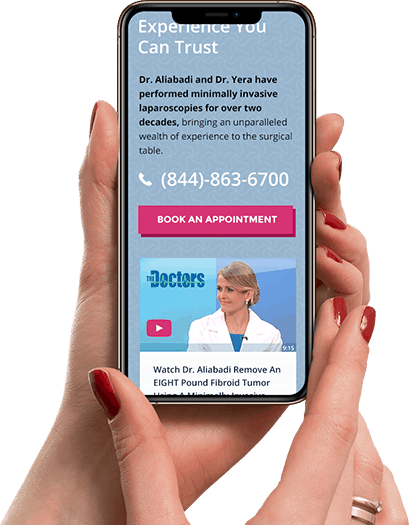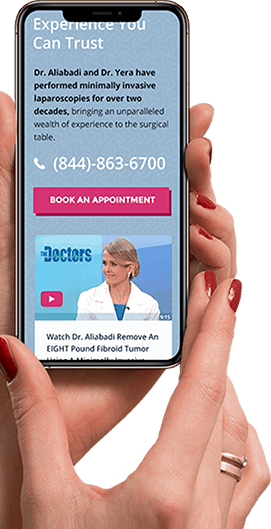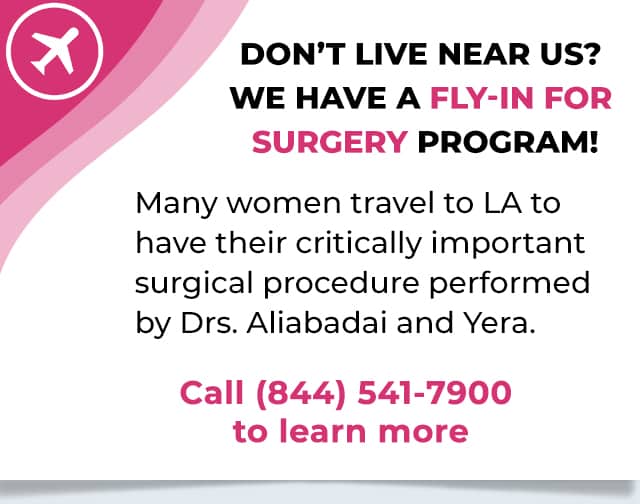If you’re struggling to conceive, you’re likely considering infertility treatment or in vitro fertilization (IVF). Although we at the Outpatient Hysterectomy Center (OHC) don’t offer these, we do offer minimally invasive surgical procedures that may improve your chances of getting pregnant, depending on what’s causing your infertility.

What is minimally invasive surgery?
Minimally invasive surgery uses the latest technology and advanced surgical instruments to diagnose and treat health issues that previously required open surgery (laparotomy). It involves either small incisions or no incisions at all, which lowers the risk of complications compared to traditional surgery.
In reproductive medicine, a laparoscopy or hysteroscopy could improve your chance of conceiving without having to resort to more invasive surgeries.
What are laparoscopy and hysteroscopy?
A laparoscopy is an outpatient surgical procedure that uses a long, thin camera (laparoscope) inserted through a small incision in the lower abdomen to send pictures to a monitor, giving our surgeon a visual of your reproductive organs.
A diagnostic laparoscopy allows us to evaluate the ovaries, fallopian tubes, and the outside of the uterus and treat any gynecological problems we discover, all with minimal trauma.
A hysteroscopy uses a thin, lighted tube (hysteroscope) inserted through the vagina. Carbon dioxide gas or saline is then injected into the uterus through the hysteroscope, expanding the uterine cavity and enabling our surgeon to view the cervical canal and inside of the uterus.
An operative hysteroscopy or laparoscopy allows us to treat some causes of infertility, such as polyps, fibroids, or adhesions within the uterine cavity. We can also take samples of the endometrium for biopsy. You will be under local or general anesthesia during any of these procedures for your comfort.
There may be mild cramping or bleeding after a hysteroscopy, but laparoscopy and hysteroscopy recovery times are substantially less than traditional abdominal surgery.
What are uterine polyps?
A uterine polyp is an overgrowth of the inner lining of the uterus that may cause an inflammatory response, preventing an embryo from implanting on the uterine wall.
A polyp could also block the fallopian tube where it enters the uterine cavity, block the cervix, or contribute to miscarriages. Removing polyps could increase your odds of conception.
How do fibroids impact fertility?
Uterine fibroids are benign growths in the uterus that can cause abnormal uterine bleeding and affect fertility and pregnancy.
Fibroids bulging into the center of the uterus make it more difficult for an embryo to implant, but they can be removed with laparoscopic myomectomy.
With a myomectomy, our surgeons, Dr. Aliabadi and Dr. Yera can remove fibroids of any size through only three 5mm wide incisions!
What are pelvic adhesions?
Pelvic adhesions are areas of scar tissue located on the reproductive organs and abdominal wall that are caused by pelvic inflammatory disease and endometriosis.
Gynecological surgery can also sometimes result in scar tissue, such as when removing fibroids or ovarian cysts.
Adhesions prevent the embryo from implanting in the uterine wall and can block the fallopian tube near the ovary, resulting in a greater risk of infertility, recurrent miscarriage, and ectopic pregnancy.

Call 877-760-3564 or click here to schedule online
Can you fix a uterine septum?
A uterine septum is a congenital abnormality where a membrane runs down the middle of the uterus, which hinders an embryo from implanting on the uterine wall.
After hysteroscopic uterine septum resection, 20% of people who were previously unable to conceive become pregnant.
One study concluded that uterine septum resection improved reproductive outcomes, while another found that it aided those with a history of spontaneous abortion.
Does endometriosis impact fertility?
Endometriosis is a condition where the lining of the uterus grows outside the uterus, causing pelvic pain and infertility. It affects 5-10% of reproductive-age women globally and can reduce fertility due to:
- Scarred fallopian tubes
- Impeded egg growth
- ·Hormonal imbalance
- Chronic pelvic inflammation
While there is no cure, laparoscopic surgery is the most effective way to treat endometriosis-associated infertility.
What is a diagnostic hysteroscopy?
If you’re struggling to conceive and trying to figure out why, a diagnostic hysteroscopy may be able to help. With a hysteroscopy, a long, thin camera is inserted into the uterus, allowing us to potentially visualize the cause of infertility if it’s physical.
Another diagnostic procedure that allows us to visualize the inside of the uterus, fallopian tubes, and ovaries is a hysterosalpingogram. A hysterosalpingogram is an X-ray of the organs that lets the surgeon check for problems before doing an internal examination.
When it comes to gynecological surgery, there’s no substitute for experience
Dr. Thais Aliabadi and Dr. Ramon Yera are the recipients of dozens of awards for medical excellence and patient satisfaction and have joined forces to create the Outpatient Hysterectomy Center, a world-class surgical practice dedicated exclusively to women’s health.
Drs. Aliabadi and Yera are renowned experts in the field of minimally invasive pelvic surgeries, offering hysteroscopic and laparoscopic procedures; they have both performed thousands over the past two decades. They are pleased to work with a team of highly experienced, dedicated professionals who will help make your pre- and post-procedure experience as pleasant and stress-free as possible.
If you are considering gynecologic surgery, you owe it to yourself to learn about the minimally invasive surgical treatment options available today.
Schedule a consultation today to have a candid conversation about your condition with one of our surgeons in a discreet and non-intimidating setting, where they can address all your questions and explore what surgical procedure might be most suitable for you.
To schedule an appointment, please request a consultation online or call us at 844-541-7900.










